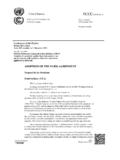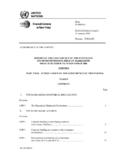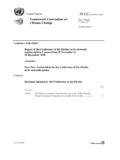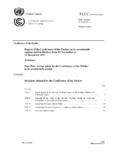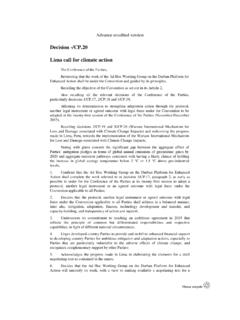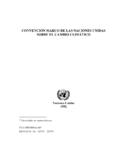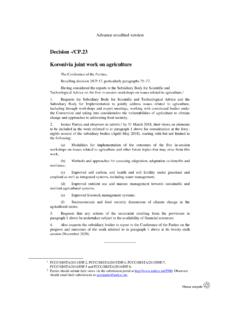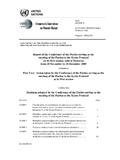Transcription of Talanoa dialogue - UNFCCC
1 COP agenda item 4. Informal note by the Presidencies of COP 22 and COP 23. 16 November 2017. Talanoa dialogue Approach The Presidencies of COP 22 and COP 23 conducted extensive consultations on the Talanoa dialogue throughout 2017, which continued during the twenty-third session of the COP. This informal note has been prepared by the Presidencies of COP 22 and COP 23 on this basis. The President of COP 23 will announce the final approach at the final plenary meeting of the COP on Friday, 17 November. Mandate The COP by its decision 1 , paragraph 20, decided to convene a facilitative dialogue among Parties in 2018 to take stock of the collective efforts of Parties in relation to progress towards the long-term goal referred to in Article 4, paragraph 1, of the Agreement and to inform the preparation of nationally determined contributions pursuant to Article 4, paragraph 8, of the Agreement.
2 Features of the Talanoa dialogue Based on input received by Parties, the main features of the dialogue are as follows: The dialogue should be constructive, facilitative and solutions oriented;. The dialogue should not lead to discussions of a confrontational nature in which individual Parties or groups of Parties are singled out;. The dialogue will be conducted in the spirit of the Pacific tradition of Talanoa : o Talanoa is a traditional approach used in Fiji and the Pacific to engage in an inclusive, participatory and transparent dialogue ;. o The purpose of Talanoa is to share stories, build empathy and trust.
3 O During the process, participants advance their knowledge through common understanding;. o It creates a platform of dialogue , which results in better decision-making for the collective good;. o By focusing on the benefits of collective action, this process will inform decision-making and move the global climate agenda forward;. The dialogue should be conducted in a manner that promotes cooperation;. The dialogue will be structured around three general topics: o Where are we? o Where do we want to go? o How do we get there? 1. The dialogue will be conducted in a manner that promotes enhanced ambition. The dialogue will consider, as one of its elements, the efforts of Parties on action and support, as appropriate, in the pre-2020 period.
4 The dialogue will fulfil its mandate, in a comprehensive and non-restrictive manner;. The dialogue will consist of a preparatory and a political phase;. The Presidencies of COP 23 and COP 24 will jointly lead both phases of the dialogue and co-chair the political phase at COP 24;. A dedicated space will be provided in the dialogue , both during the preparatory and the political phase to facilitate the understanding of the implications of the Special Report by the Intergovernmental Panel on Climate Change on Global Warming of C;. As regards inputs to the dialogue : o The Special Report by the IPCC on global warming of C requested by the COP will inform the dialogue .
5 O Parties, stakeholders and expert institutions are encouraged to prepare analytical and policy relevant inputs to inform the dialogue and submit these and other proposed inputs, including those from intergovernmental organisations and UNFCCC bodies, by 2 April 2018 for discussions in conjunction with the May session, and by 29 October 2018 for discussions in conjunction with COP 24;. o The Presidencies of COP 23 and COP 24 will also provide inputs to inform the dialogue ;. o An online platform will facilitate access to all inputs to the dialogue , which will be overseen by the Presidencies of COP 23 and COP 24.
6 O The secretariat will be requested to prepare relevant inputs and to develop and manage the online platform under the guidance of the Presidencies of COP 23 and COP 24;. The preparatory phase will seek to build a strong evidence-based foundation for the political phase: o The preparatory phase will start when the dialogue is launched at COP 23. and will end at COP 24;. o Parties and non-Party stakeholders are invited to cooperate in convening local, national, regional or global events in support of the dialogue and to prepare and make available relevant inputs;. o The May discussions will be used to explore the three central topics informed by inputs by various actors and institutions, including from the Technical Examination Process and Global Climate Action, with the support of the high-level champions.
7 O Summaries from all discussions will be prepared under the authority of the Presidencies of COP 23 and COP 24;. o The information and insights gained during the preparatory phase will be synthesised by the Presidencies of COP 23 and COP 24 to provide a foundation for the political phase;. 2. Figure 1 - Preparatory phase The political phase will bring high-level representatives of Parties together to take stock of the collective efforts of Parties in relation to progress towards the long-term goal referred to in Article 4, paragraph 1, of the Agreement and to inform the preparation of nationally determined contributions pursuant to Article 4, paragraph 8, of the Agreement: o The political phase will take place at COP 24 with the participation of Ministers.
8 O This phase will build on the preparatory phase and focus on the objectives of the dialogue ;. o Political discussions will include roundtables to ensure focussed and interactive discussions among Ministers;. o At the closing meeting of the dialogue , the Presidencies of COP 23 and COP 24 will provide a summary of key messages from the roundtables;. 3. Figure 2 - Political phase It will be important to send clear forward looking signals to ensure that the outcome of the dialogue is greater confidence, courage and enhanced ambition;. The outcome of the dialogue is expected to capture the political momentum, and help Parties to inform the preparation of nationally determined contributions.
9 The outputs of the dialogue will include reports and summaries of the discussions. 4.

